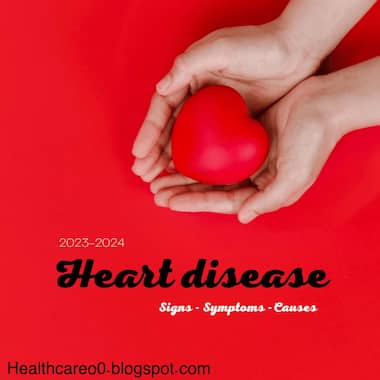 |
| Heart disease |
Heart disease refers to a broad range of conditions that affect the heart and blood vessels, including the coronary arteries, heart valves, and heart muscles. Heart disease occurs when the blood vessels that supply blood and oxygen to the heart become damaged or narrowed, leading to reduced blood flow to the heart muscle. This can cause chest pain (angina), heart attacks, or even heart failure.
Related topics: Stomach Ulcers: Symptoms, Causes, Treatment, and Prevention
Blood vessel symptoms of heart disease
Heart disease symptoms can vary depending on the specific type of heart disease and its severity. The following are the most common symptoms of heart disease in the blood vessels:
Chest Pain (Angina)
Chest pain or discomfort is one of the most common symptoms of heart disease. It usually occurs when the heart muscle doesn't receive enough blood and oxygen, causing chest pain or discomfort. This pain can be described as a pressure, squeezing, or fullness in the chest. It may also be felt in the shoulders, arms, neck, jaw, or back.
Shortness of Breath
Shortness of breath or difficulty breathing is another common symptom of heart disease. It occurs when the heart is unable to pump enough blood to meet the body's needs, leading to a buildup of fluid in the lungs. Breathing may become difficult as a result, particularly when exercising or when lying down.
Fatigue and Weakness
Fatigue and weakness are also common symptoms of heart disease. They occur when the heart is unable to pump enough blood to meet the body's needs, leading to a reduced supply of oxygen and nutrients to the muscles and organs.
Dizziness or Fainting
Another sign of heart disease is feeling faint or dizzy. It occurs when the brain doesn't receive enough blood and oxygen, leading to dizziness or fainting spells.
Swollen Ankles, Feet, or Legs
Swollen ankles, feet, or legs are common symptoms of heart disease. They occur when the heart is unable to pump enough blood to the body, leading to a buildup of fluid
Related topics; Simple Steps to avoid type 2 diabetes
Blood vessel symptoms of heart disease
Heart disease is a term used to describe a range of conditions that affect the heart and blood vessels. It is a leading cause of death worldwide, but early detection and treatment can improve outcomes. In this article, we will discuss the symptoms of heart disease in the blood vessels and the different types of heart disease.
What is Coronary Artery Disease?
The most prevalent kind of cardiac illness is coronary artery disease (CAD). It happens when a buildup of plaque causes the blood arteries that feed the heart with blood and oxygen to become constrictive or clogged. The symptoms of CAD may include:
- Chest pain or discomfort (angina)
- Shortness of breath
- Fatigue
- Nausea
- Sweating
- Irregular heartbeat
Irregular heartbeats can cause symptoms of heart disease
Heart arrhythmias are abnormal heart rhythms that can be caused by a variety of factors, including high blood pressure, heart disease, and stress. Some of the symptoms of heart arrhythmias include:
- Fluttering or racing heartbeat
- Slow heartbeat
- Chest pain or discomfort
- Shortness of breath
- Lightheadedness or dizziness
- Fainting or near-fainting
Heart Disease Symptoms Caused by Congenital Heart Defects
Congenital heart defects are heart abnormalities that are present at birth. Some of the symptoms of congenital heart defects include:
- Cyanosis (blue-tinted skin or lips)
- Shortness of breath
- Fatigue
- legs, the stomach, or the region around the eyes swelling
- Poor growth or development
- Abnormal heartbeat
Heart Disease Symptoms Caused by Diseased Heart Muscle
- Shortness of breath
- Fatigue
- Swelling in the legs, ankles, or feet
- Dizziness or lightheadedness
- Chest pain or discomfort
- Irregular heartbeat
Heart Disease Symptoms Caused due to Heart Valve Problems
Valvular heart disease occurs when one or more of the heart valves do not function properly, causing the blood to flow inefficiently. The symptoms of valvular heart disease may include:
- Shortness of breath
- Fatigue
- Chest pain or discomfort
- Dizziness or lightheadedness
- Irregular heartbeat
- Swelling in the ankles, feet, or abdomen
What are the 4 Signs Your Heart is Quietly Failing?
Heart failure is a serious condition in which the heart cannot pump blood efficiently. Some of the signs that your heart may be failing include:
- Fatigue and weakness
- Shortness of breath
- Swelling in the legs, ankles, or feet
- Irregular heartbeat
What are 3 Signs Your Heart is Failing?
Other signs that your heart may be failing include:
- Persistent cough or wheezing
- Rapid weight gain
- Loss of appetite or nausea
What are 3 main Early Warning Signs when Your Heart is Failing?
It is important to be aware of the early warning signs of heart failure, which may include:
- Fatigue or weakness
- Shortness of breath
- Swelling in the legs, ankles, or feet
Heart disease is a condition that affects millions of people worldwide. It is essential to be aware of the different types of heart disease and their symptoms.
Related topics; What causes abdominal pain and treatment


Comments
Post a Comment